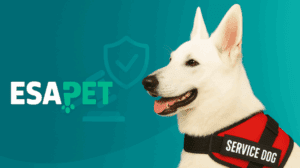ESA Verification: Identifying Original and Fake ESA Letters

Verifying Emotional Support Animal letters might seem like a chore, but it’s important. With more people needing ESAs, there’s been a spike in fake ESA letters. These fake letters can cause serious issues for both animal owners and those they interact with.
The rise in demand for emotional support animals has led to many people getting fake ESA letters from shady sources. Using these fake letters can land you in hot water and strip you of the benefits of having an emotional support animal.
Specific laws, like the Fair Housing Act (FHA) and the Air Carrier Access Act (ACAA), regulate ESA letters to ensure their legitimacy. Only licensed mental health professionals can issue legitimate ESA letters. Stick with us, and we’ll show you how to spot fake ESA letters and avoid trouble.
How to Verify a Legitimate ESA Letter?
To ensure an ESA letter is legitimate, it must be written by a licensed mental health professional (LMHP). This healthcare professional can be a psychologist, psychiatrist, therapist, or clinical social worker. This guarantees the letter’s credibility and adherence to legal standards.
The emotional support animal letter should be on the LMHP’s official letterhead. It should include the LMHP’s name and address. The letter must also include the LMHP’s license number, issue date, and contact information to verify its authenticity.
Additionally, the letter must state that the person has a disability recognized in the Diagnostic and Statistical Manual (DSM). The healthcare provider should confirm that the ESA is a necessary part of the individual’s treatment plan and essential for their mental health.
You Don’t Need an ESA Verification Number
Legitimate ESA letters do not need an ESA verification number. Some services may offer these numbers as part of their fraudulent schemes. However, they are not recognized by any official entity. The inclusion of a verification number indicates a potential scam.
A genuine emotional support animal letter must only be written by an LMHP. It should be on their official letterhead and include their license number, date, and contact information. It should also state the person’s disability and confirm the necessity of the ESA for their treatment plan.
Important Elements of a Legitimate ESA Letter
- Written by a licensed mental health professional (LMHP).
- Printed on the LMHP’s or ESA Company’s official letterhead.
- Includes the LMHP’s license number, date, and contact information.
- States that the individual has a mental or emotional disability recognized in the DSM.
- Asserts that the emotional support animal is part of the individual’s treatment plan.
Laws Against the Misrepresentation of Emotional Support Animals
Misrepresenting an emotional support animal can have serious legal consequences. Federal laws like the Fair Housing Act (FHA) and the Air Carrier Access Act (ACAA) protect the rights of individuals with ESAs. These laws impose strict rules against fraudulent claims.
Under the FHA, landlords must provide reasonable accommodations for ESAs. However, presenting a fake ESA letter can lead to eviction and legal action. Under the ACAA, unlike service animals, ESAs are no longer eligible for free travel benefits. Misrepresenting an ESA can result in fines and a ban.
South Carolina law H5041 stipulates fines and penalties for those who misrepresent a pet as an ESA. Similarly, California’s Penal Code 365.7 makes it a misdemeanor to claim an animal as an ESA or service animal falsely. Offenders are fined up to $1,000 and up to six months in jail.
How to Report Fake Emotional Support Animal Services
Reporting fake ESA services is important to protect yourself and others from scams. Here’s a simple guide to help you take action:
Identify a Fake Service:
Look out for red flags. It can include offers of instant approval, lack of professionals, and the inclusion of verification numbers. These are signs that the service might not be legitimate.
Report to the Right Authorities:
Contact your state licensing board to report the fraudulent service. You can also file a complaint with the Americans with Disabilities Network.
Gather Evidence:
Collect all related documents, emails, and screenshots that show the fraudulent activity. This evidence will be crucial when submitting your complaint. It helps authorities investigate the scam.
Submit Your Complaint:
Once you have all your evidence, submit your complaint to the relevant authorities. Be clear and concise in your description of the fake service. Be sure to provide all the gathered evidence to support your case.
Unauthorized Verification for Emotional Support Animals
You might encounter confusing and misleading practices about ESAs. Many services offer official products or registrations but aren’t legal. Let’s break down these common practices so you can avoid scams and make sure your assistance animals are properly supported.
ESA ID or ESA Verification Numbers
You don’t need a special ID or verification number for your ESA. If a service offers you these, it’s a scam. Legitimate ESAs only need a letter from a licensed professional. These offers often come from fraudulent services trying to take advantage of people.
ESA Registration
There is no official ESA registration system recognized by federal law. Any claims you need to register your ESA are false and part of a scam. The only need for an ESA is a legitimate letter. Any service insisting on a registration number is trying to deceive you.
ESA Vests
ESA vests can be helpful for public identification. However, they are not required and do not replace an ESA letter. These vests can help recognize your animal as an ESA but have no legal value. Your animal’s legitimacy comes from the ESA letter, not from any accessories it wears.
ESA Certificates
Fraudulent services often market ESA certificates. Certified ESAs hold no legal value without a proper ESA letter from an LMHP. These certificates might look official, but they are not. Ensure you have the proper letter to confirm your ESA, and don’t rely on certificates alone.
How to Certify A Tenant’s Right to an Emotional Support Animal?
Certifying a tenant’s right to an Emotional Support Animal (ESA) under the Fair Housing Act (FHA) can be simple if you know what to do. Here’s a straightforward guide for both landlords and tenants.
Landlords can ask for documentation when a tenant makes an ESA request. The tenant needs to provide an ESA letter from a licensed professional. This letter should say that the tenant has a disability recognized in the DSM and that the ESA is part of their treatment.
Tenants must get a legitimate ESA letter from a healthcare professional. This professional can be a therapist, psychologist, or psychiatrist. The letter must be on the professional’s letterhead and include their license number, contact information, and the date.
Under the FHA, many tenants with a valid ESA letter are protected from discrimination. A landlord cannot refuse residence or charge extra pet fees or deposits. The law ensures that landlords make reasonable accommodations for ESA owners, even if there is a no-pets policy.
Clear and respectful communication is key during the ESA request process. Tenants should ensure their documentation is complete and accurate. A landlord should be willing to provide reasonable accommodations.
If disagreements arise, it’s best to refer to the FHA guidelines or seek advice from the legal platform to ensure everything is handled correctly.
ESA Letter: The Only Federally Recognized Documentation
The only acknowledged form for an Emotional Support Animal is an ESA letter issued by a licensed mental health professional. This letter helps verify the need for an ESA. It ensures the individual receives the necessary accommodations.
Who Can Issue an ESA Letter?
Only qualified mental health professionals can issue an ESA Letter. The qualified professionals can be psychologists, psychiatrists, and licensed clinical social workers. You need to verify the credentials of the issuing professional. It is important to ensure the letter’s legitimacy.
Frequently Asked Questions on ESA Verification and Registration
ESA verification numbers are not required and often indicate a fraudulent service. Legitimate emotional support animal letters do not need a verification number. Instead, a proper ESA letter from a licensed mental health professional is the only documentation needed.
An LMHP must write a legitimate ESA letter. It should be on their official letterhead and include their license number, contact information, and the date. It should state that the individual has a disability recognized in the DSM and that the ESA is part of their treatment.
An ESA certificate has no legal standing, and fraudulent services often market it. What is actually needed is a legitimate ESA letter from a licensed professional. This letter is the only federally recognized document for emotional support animals.
ESA verification numbers are not legally required. There is no national registry for Emotional Support Animals. The only legitimate documentation for an ESA is a letter from a licensed mental health professional.
ESA Verification: Wrapping Up
Ensuring your ESA letter is legitimate is important, especially with the rise in fake documents. These fake letters can cause serious problems for everyone involved. Knowing how to spot a real ESA letter helps protect you and others.
A real ESA letter should come from a licensed mental health professional. It should be on their official letterhead and include their license number, date, and contact information. It should also state that you have a disability and confirm that the ESA is part of your treatment plan.
Misrepresenting an ESA can lead to serious legal trouble. Federal laws like the Fair Housing Act (FHA) protect people with valid ESAs, while state laws have penalties for fake claims.
Verifying ESA letters ensures your rights and keeps the system fair for everyone who genuinely needs support. This way, the support system remains effective and trustworthy.

ESA and Service Animal Rights, Housing, Psychiatric Service Dog, Public Access, Service Animals, Travel
Penalty for Refusing Service Dog: What i...
Jonalyn Dionio
Dec 12 2025

Psychiatric Service Dog, ESA and Service Animal Rights, Service Animals
How Many Service Animals Can You Have? G...
Julia Oliveira
Dec 12 2025


